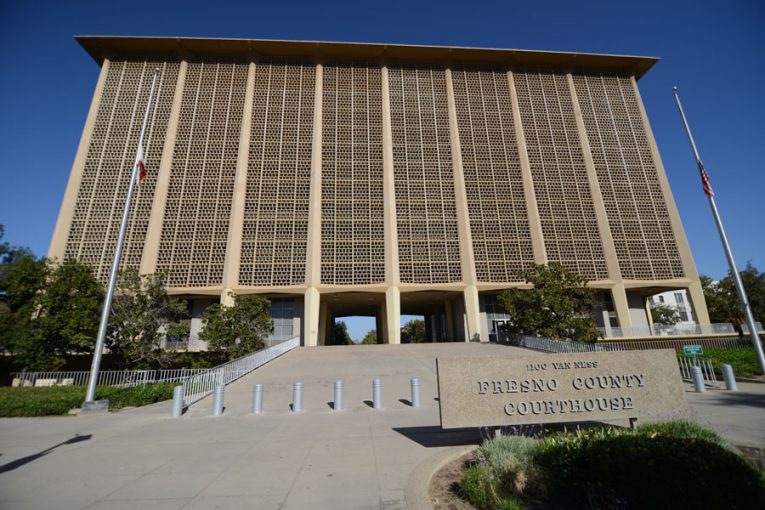

By Shellsea Lomeli
FRESNO – During an arraignment in a domestic violence case, Judge Monica Diaz eventually granted the defense’s request to be served with a peaceful contact order through remote measures, despite the judge’s original demand for the defendant to physically appear in court.
Many hearings at the Fresno County Superior Courthouse continue to proceed remotely due to the public health risks brought on by the COVID-19 pandemic. Judges have had to change the ways these hearings operate in a way that still represents the law and justice, but also considers the health of all individuals involved in these proceedings.
While many defendants have been allowed to appear in court remotely, judges have said they believe certain hearings call for an in-person presence. This seemed to be the case for the following hearing based on Judge Diaz’s original order, which was quickly changed as the proceeding went on.
On July 2, Charles Gulley appeared in court as a defendant in a domestic violence case. According to police reports, a disagreement had occurred between Gulley and his partner of 19 years prior to the physical violence that allegedly occurred that night.
The upset. alleged victim had approached Gulley at a local establishment. According to the report, Gulley struck the victim who was intoxicated at the time, causing her to fall to the ground.
“She felt a strike to the right side of her head and a kick to the ribs,” Deputy District Attorney Carlie Bruce stated over Zoom. The alleged victim
 yelled for help and the two were separated. She refused medical treatment and denied an emergency protective order which would have protected her from being contacted, harmed, threatened, or approached by Gulley.
yelled for help and the two were separated. She refused medical treatment and denied an emergency protective order which would have protected her from being contacted, harmed, threatened, or approached by Gulley.
Gulley’s attorney, Marc Kapetan from Kapetan Brother’s Law Firm, told the court that the disagreement between the couple was based on “issues regarding jealousy.
“A lot of what we are seeing is half the story,” argued the defense. “[The defendant] is typically not the type that would argue.
According to Kapetan, Gulley has no prior criminal record, with the exception of a marijuana charge from decades ago.
The defense requested a contact protective order because Gulley and the victim live together and have been in a peaceful relationship for nearly two decades.
There are two types of criminal protective orders (CPOs), “No Contact” orders, and “Peaceful Contact” orders. The order requested by the defense would permit contact between Gulley and his partner but only if the contact is peaceful in every way.
The deputy district attorney had no objection to the order.
A Peaceful Contact protective order was issued by Judge Diaz, despite the victim’s original refusal of protection.
While issuing the CPO, the judge expressed concern about Gulley being served with the order through remote measures.
“He [Gulley] is not in court, he’s in your office and he needs to be served with this. He needs the copy that I sign,” said Judge Diaz to the defense attorney.
Kapetan responded with frustration. “The courts are going to need to figure it out in this nutty day and age,” he stated, referring to the pandemic.
Judge Diaz reflected that the need for the defendant’s physical presence in court was in line with the altered procedures the courts have already agreed on. She stated that Gulley must come to court and follow health safety regulations.
According to an emergency administrative rule by Fresno County in response to COVID-19, “all visitors, including law enforcement, attorneys, vendors, and court users, must wear a face covering at all times when inside any court building throughout the County.”
“I don’t know if he [Gulley] has a mask or anything like that,” Kapetan argued against the court’s protocol.
Following the defense’s argument against Gulley appearing in court, Judge Diaz did agree to allow remote measures to be used to serve the defendant with the protective order.
Judge Diaz faxed over the order with her signature and the defense attorney handed it to his client on camera for the court to see.
The Peaceful Contact protective order states that Gulley is not to harass, strike, or assault the protected party. He also cannot own or try to buy any firearms. The defendant also agrees to not pressure the victim to not testify in court. The protected party may record any altercations between and the defendant and her.
After the order was served to Gulley, Deputy District Attorney Bruce repeated the judge’s original request for the defendant to be present in court to confirm that he did indeed get the order.
The request was denied by Judge Diaz, who expressed her belief that the remote alternative was sufficient enough.
To sign up for our new newsletter – Everyday Injustice – https://tinyurl.com/yyultcf9
